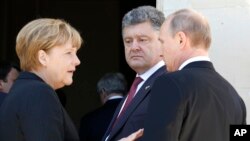Washington warned Russia Friday that it could impose new sanctions if Moscow does not do more to defuse the conflict in eastern Ukraine. The Obama administration said it has delayed implementation as it presses for unified support from European and U.S. manufacturers for the measures.
Meanwhile, at a Brussels summit, EU leaders set a Monday deadline for Putin to demonstrate support for calming the unrest in Ukraine.
In a statement issued Friday, the 28 leaders called for Moscow to meet several conditions, including visibly supporting the Ukrainian government's proposed peace plan. Ukraine's government also should be granted oversight of three major border checkpoints, according to the statement.
Two other terms include setting up a means of verifying the cease-fire and securing the release of all captives, the French news agency AFP reported.
If Putin fails to meet those conditions, Russia could face "further significant restrictive measures," the statement said.
Analysts say the threat of sanctions is putting the European Union in an awkward position. The 28-nation bloc hopes to avoid a broader economic clash with Moscow that would hurt their own businesses.
Germany-Russia relationship
German Chancellor Angela Merkel reportedly has warned Putin that the EU will consider a new round of sanctions against Moscow if it doesn't cooperate.
The relationship between Russia and Germany involves deep business ties.
With a heavy dependence on Russian oil and gas and extensive business interests in the country, Germany is in a vulnerable position with the U.S. threatening a new round of sanctions.
The close bond might explain why Merkel had been advocating caution on punishing Russia in her talks with the United States. Analysts say she was hopeful that Putin would eventually back down and accept proposals to ease the crisis.
But her confidence in the Russian leader faded after he admitted that he had sent Russian troops into Crimea this spring.
John Lough, with the Russia and Eurasia Program at London's Chatham House, says Germany is now starting to push a harder line against Russia.
"The Germans have been very shocked by Russia's behavior and by the annexation of Crimea and the subsequent destabilization," he said. "I think they see pretty clearly that Russia is playing a double game at the moment: that it is outwardly supporting the peace process at the moment, but it, at the same time, doesn't seem to be doing much to try to defuse the conflict in the Donbas."
The Obama administration's new sanctions would include imposing a ban on any interactions with some of Russia's largest banks, cutting off technology transfers to Russian energy and defense firms, and shutting down business with Russian defense companies.
This could prove difficult for the European bloc.
Financial impact
The EU is Russia's largest trading partner, and almost half of Russia's exports -- $292 billion worth -- end up in EU countries. Russia, in turn, is the EU's third biggest trading partner, with $169 billion in imports. And, Russia supplies about a quarter of the EU's gas.
Despite Europe's heavy reliance on Russia for energy and trade, Lough thinks the EU will impose some sanctions.
"I think that we have gotten to the point where if the Russians don't engage properly in this process of finding a solution to the crisis in Ukraine, then they can expect to see more things coming down the line," Lough said. "These will be highly targeted sanctions. I don't think we are going to see blanket measures -- imposed on the financial sector, for example -- but they could be things that go well beyond the blacklisting of specific individuals that we have seen so far."
Putin
Even if sanctions are implemented, analyst James Nixey of Chatham House says Putin's actions will not change.
"Putin is what he was. He is a KGB colonel with a specific view of the world and a few sanctions, (or) measures designed effectively to protect Western economies, are not going to change his basic goals, which are to ensure that certain states -- in this particular case, Ukraine -- remain east of an east-west dividing line," Nixey said.
Nixey says Russia will continue to try to destabilize Ukraine. And, with Ukraine's own political and economic challenges, that could be an easy task.
"I don't see a prosperous, liberal democratic flourishing part of a west Ukraine any time in the immediate future, I am afraid to say," he said.
On Friday, EU integration agreements with Ukraine, Georgia and Moldova pulled the three former Soviet republics westward despite staunch resistance from Moscow. That move, analysts say, will likely toughen Putin's resolve to continue to keep Ukraine in chaos.










